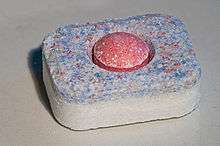Dishwasher detergent

Dishwasher detergent is a detergent made for washing dishes in a dishwasher. Dishwasher detergent is different from dishwashing liquid made to wash dishes by hand.
Uses
When using a dishwasher, the user gets a special detergent for its use.[1] All detergents are designed for use after the user scrapes leftover food from the dishes before washing.[2] To function, the user places dishes in the dishwasher in such fashion that the surface of all dishes is open to the flow of water.[2]
Most dishwasher detergents are incompatible for use with silver, brass, cast iron, bronze, pewter, and goldleaf.[2] They can also harm disposable plastic, anything wood, knives with hollow handles, and fine glassware.[2]
Types
The best dishwasher detergents would be those that clean dishes the best, leave the least cleaner after rinsing, have versatility in cleaning various types of dish surfaces and food, are easiest to use, and the best value for price.[1] There is variation in how effective different detergents are in removing dried food from glass and baked-on sticky food from pots.[1] In the course of washing, a better detergent will both prevent washed-away food from redepositing on the dishes, and also prevent mineral accumulation or discoloration of the dishes.[1]
Composition
Different kinds of dishwashing detergent contain different combinations of ingredients. Common ingredients include:
- Phosphates
- Bind calcium and magnesium ions to prevent 'hard-water' type limescale deposits. They can cause ecological damage, so their use is starting to be phased out. Phosphate-free detergents are sold as eco-friendly detergents.
- Oxygen-based bleaching agents (older-style powders and liquids contain chlorine-based bleaching agents)
- Break up and bleach organic deposits.
- Non-ionic surfactants
- Lower the surface tension of the water, emulsifies oil, lipid and fat food deposits, prevents droplet spotting on drying.
- Alkaline salts
- These are a primary component in older and original-style dishwasher detergent powders. Highly alkaline salts attack and dissolve grease, but are extremely corrosive (fatal) if swallowed. Salts used may include metasilicates, alkali metal hydroxides, sodium carbonate etc.[3]
- Enzymes
- Break up protein-based food deposits, and possibly oil, lipid and fat deposits. Proteases do this by breaking down the proteins into smaller peptides that are more easily washed away .
- Anti-corrosion agent(s)
- Often sodium silicate, this prevents corrosion of dishwasher components .
Dishwashing detergent may also contain :
- Anti-foaming agents
- Foam interferes with the washing action.
- Additives to slow down the removal of glaze & patterns from glazed ceramics
- Perfumes
- Anti-caking agents (in granular detergent)
- Starches (in tablet based detergents)
- Gelling agents (in liquid/gel based detergents)
- Sand (inexpensive powdered detergents)
Dishwasher detergents are strongly alkaline (basic).
Inexpensive powders may contain sand. Such detergents may harm the dishes and the dishwasher. Powdered detergents are more likely to cause fading on china patterns.[4]
Besides older style detergents for dishwashers, biodegradable detergents also exist for dishwashers. These detergents may be more environmentally friendly than conventional detergents.
Hand-washing dish detergent (washing up liquid) creates a large foam of bubbles which will leak from the dishwasher.
Rinse aid
Rinse aid (sometimes called rinse agent) contains surfactants and uses Marangoni stress to prevent droplet formation, so that water drains from the surfaces in thin sheets, rather than forming droplets.
The benefits of using it are that it prevents "spotting" on glassware (caused by droplets of water drying and leaving behind dissolved limescale minerals), and can also improve drying performance as there is less water remaining to be dried. A thinner sheet of water also has a much larger surface-area than a droplet of the same volume, which increases the likelihood of water molecules evaporating.
References
- 1 2 3 4 "Dishwasher detergents Overview". Consumer Reports. Retrieved 17 March 2017.
- 1 2 3 4 "Dishwasher Detergent Buying Guide". Consumer Reports. January 2017. Retrieved 17 March 2017.
- ↑ "Alkaline dishwasher detergent – The Procter & Gamble Company". Freepatentsonline.com. Retrieved 2012-03-02.
- ↑ "Hotpoint Service – Appliance Repairs, Spare Parts and Accessories for Hotpoint, Creda, Ariston". Hotpointservice.co.uk. Archived from the original on 2012-03-20. Retrieved 2012-06-20.